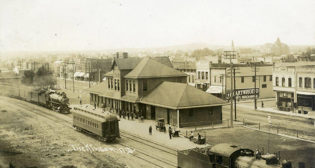
“A solution looking for a problem”
Written by William C. Vantuono, Editor-in-ChiefEditor’s note: This sounds a lot like “Theme in Search of a Movie,” a composition written years ago for the Woody Herman Thundering Herd big band. Hamberger’s characterization of the NITL proposal is rather tame compared to that of one industry observer, who called the NITL testimony at STB’s hearing on the matter “absurd.”
Hamberger stressed “the various negative impacts of a proposal to force non-market-based requirements on railroads at the request of the NITL [that] l calls for the STB to override market forces by forcing Class I railroads to turn over to their competitors substantial portions of rail traffic that moves across tracks they own and have spent billions to build, maintain, and upgrade so taxpayers don’t have to.”
“Specifically, the NITL proposal would give a small group of shippers the right to demand that in some cases where one railroad serves their facility, the serving railroad must transfer or ‘switch’ loaded railcars to competitors,” Hamberger said. “In addition to increased operating and infrastructure costs, other impacts of the proposal would include things such as: an increase in the number of locomotives and railcars needed; increased dwell and delay time; increased fuel use; reduced network efficiency; and increased risk for employee injury due to additional handling and switching requirements. This proposal is a solution looking for a problem. Railroads already voluntarily switch traffic when it makes economic sense for all parties.”
Hamberger also noted that other existing STB regulations provide various options if a shipper believes its rates are unreasonable. “In fact,” noted Hamberger, “of the 46 shipper complaints filed with the STB since 1996, 37 of the complaints were decided in favor of shippers or settled through commercial negotiations.”
“Freight railroads are among those American industries with very high fixed costs, as they operate on infrastructure they own, maintain, and continuously upgrade,” Hamberger said. “Since 1980 alone, average inflation adjusted rail rates are down 42%, while railroads have spent more than $550 billion to build, maintain, and upgrade track, signals, bridges, tunnels, and equipment. But this proposal would undermine the benefits all rail customers have seen thanks to these investments, and would all but ensure a return to the days when most rail customers were unhappy.”
The AAR maintains that, under the NITL proposal, the freight rail industry could lose about 13% of its annual net income, “roughly equivalent to what the industry spent in 2010 on capacity expansion projects designed to benefit all shippers. If the proposal were adopted, it would ensure that railroads could not recover all of their fixed costs, which would lead to postponed maintenance, deferred capital upgrades and expansion programs, service quality declines, and negative impacts to all shippers.”
“Railroads work with their customers and find market-based solutions that serve American businesses all across the country, and help ensure freight rail lives up to its mission to power our economy,” Hamberger said. “This proposal ultimately would serve the interest of a small group of shippers, but have far-reaching and long-term negative impacts on all rail customers. As American businesses and our economy are coming back from the recession, we just can’t afford to get this wrong.”
CSX also testified before the STB, and released the following statement based upon testimony by Vice President Service Design Cressie Brown:
“CSX Transportation opposes a proposal before the STB that would create unpredictable traffic flows, reduce high levels of customer service achieved over the past few years, and diminish the company’s incentive to keep investing at record levels in critically needed transportation infrastructure.
“Our work is focused on achieving high levels of service reliability and predictability, which are critical elements in meeting our customers’ needs. [This] proposal from the NITL would undermine much of what we have accomplished in the areas of reliability, efficiency, and customer service.”
Brown pointed to information and data gleaned from CSX’s Customer Advisory Councils and periodic surveys in which customers acknowledged improvements, but said they needed even more reliability to grow their own businesses: “New or expanded businesses create job growth and economic development, and rail transportation’s fuel efficiency offers significant environmental benefits.
“It is a virtuous cycle of pleasing customers, earning more business, and generating investments in additional resources and new infrastructure. The NITL proposal turns back the clock on these gains achieved over the past decade.
“The NIT League proposal would force railroads, in certain circumstances, to open up their privately built, owned, and maintained networks to competitors, creating artificial competition and transferring revenues from the railroads to the handful of customers who recommended the proposal. The proposal would create uncertainty among railroads over where to deploy resources such as locomotives and train crews, congest interchanges between railroads, and force freight back to the already stressed highways.
“I am very concerned that the NIT League proposal will force cars to locations where we do not have the resources or infrastructure to handle them. Predictable traffic flows and effective planning are essential to our ability to provide a reliable service product. And shipment visibility is critical to resource and capacity planning.”
Brown offered examples of how traffic flows could change under the NITL proposal, with one adding 300 miles and three days to an overall movement, and another routing more freight trains through an already congested city and potentially affecting passenger and commuter train service.
“It is not in the broader public interest to experiment with a forced switching scheme, which would ultimately create less reliable and less cost effective service for our customers. The U.S. freight railroad industry already provides the most cost-effective service in the world, giving U.S. companies a competitive advantage. We urge the STB to reject this sweeping regulatory restructuring and to maintain the balanced environment that is a pillar of our world-class freight rail system.”



